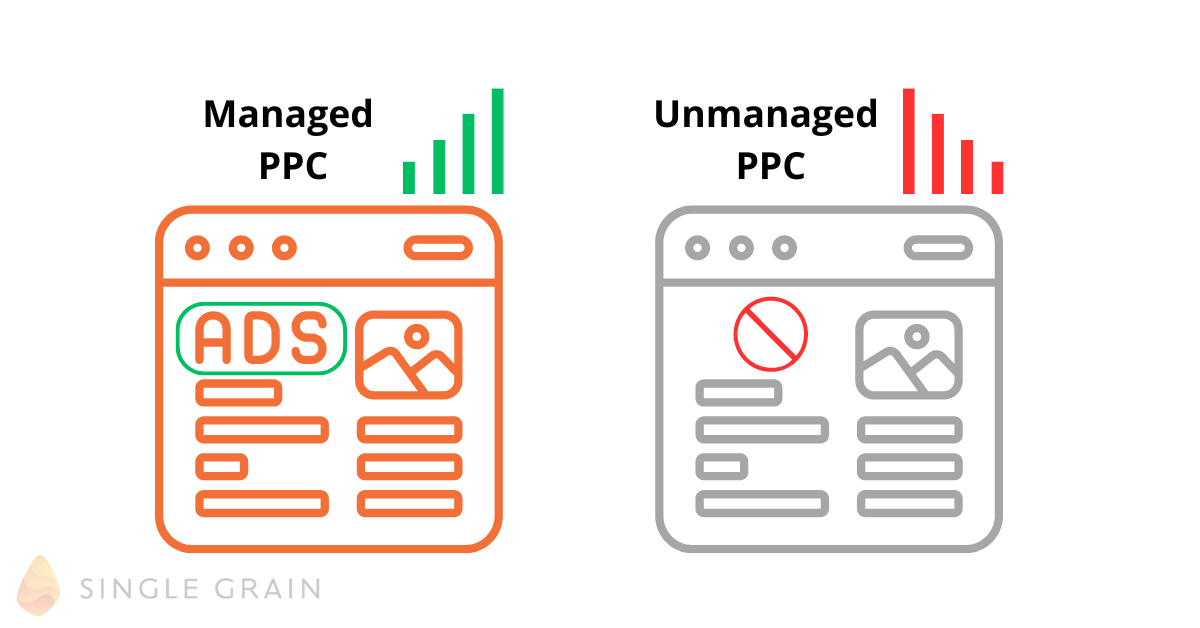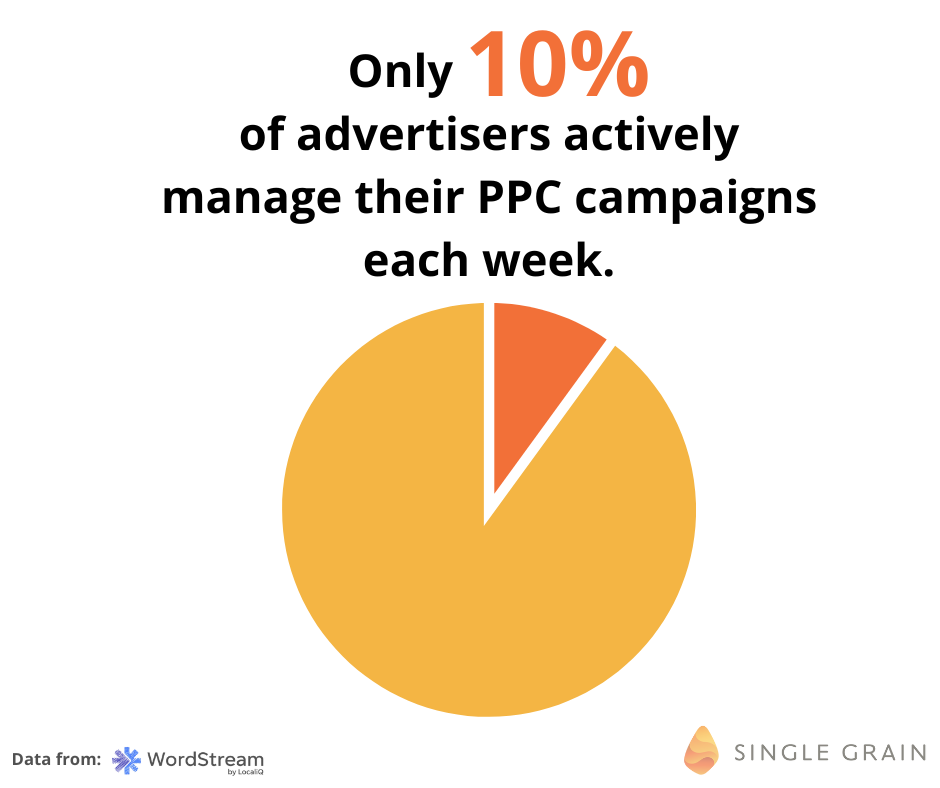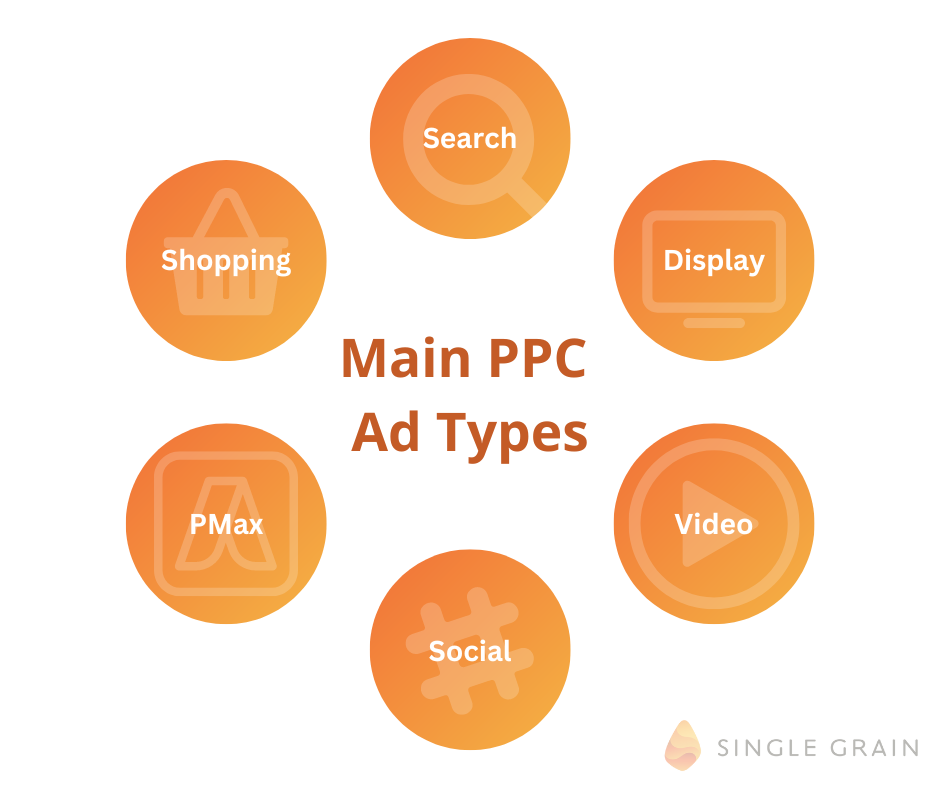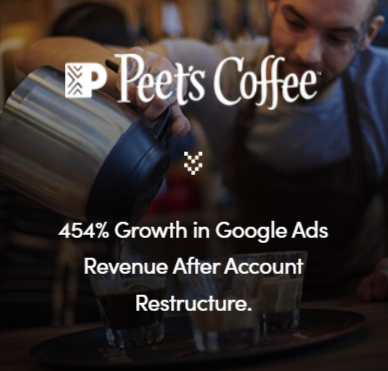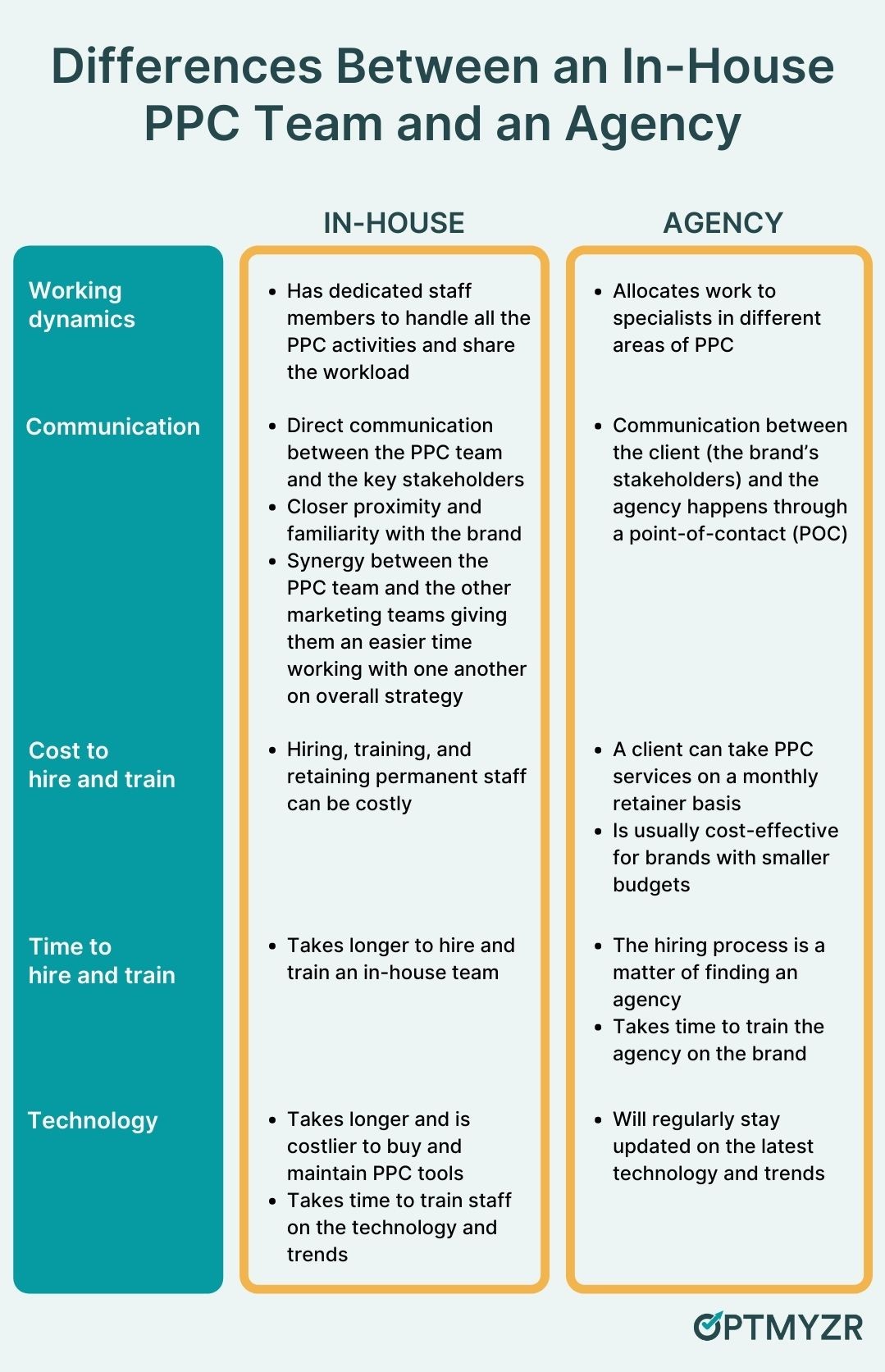Does the following sound familiar? You’ve run one or two PPC campaigns. You spent a chunk of hours upfront setting everything up, hit the “go” button, and just let it be. You quickly realize that you’re spending money, but there’s no results to show for it. That’s largely because PPC campaigns need tender loving care if you want them to be effective.
The biggest mistake with any PPC campaign is tracking the wrong metrics. Or, worse than that, not tracking anything at all. PPC management involves overseeing and optimizing a company’s monthly ad spend to ensure the best outcome in their PPC strategy. That’s why entire businesses exist solely to help brands like yours win with paid media through PPC advertising.
Curious about how effective PPC management can drive traffic, leads, and sales? Let’s take a look now.
What is PPC Management?
PPC management is all about overseeing and optimizing pay-per-click advertising campaigns to get the best bang for your buck. It involves a slew of activities aimed at fine-tuning PPC campaigns to make them perform as optimally as possible. It’s the processes, both micro and macro, that fuel productivity and profitability tied to PPC advertising.
Hiring a PPC management company can significantly enhance campaign effectiveness, allowing your business to focus on other projects and save time in the process. We’ll come back to the benefits of this shortly. For now, let’s take a look at the mechanisms that go into PPC management.
What Goes Into PPC Management?
Only 10% of advertisers actively optimize their PPC accounts each week. While that might seem pathetic, it’s actually a good thing in one sense. It suggests that there are many fewer competitors out there actually putting a concerted effort into competing. And that gives you a competitive advantage. It means the effects of your efforts in optimizing your PPC accounts become all the more potent.
Boiled down, these are the primary activities involved in PPC management:
- Smart bidding strategies: Managing Google’s smart bidding strategies like “Maximize conversion value,” “Maximize conversions,” “Target return on ad spend (ROAS),” and “Target cost per action (CPA).”
- Budget allocation: Allocating budgets in the most optimal ways to balance visibility and cost.
- Ad relevance and quality score: Ad relevance ties closely to user intent, while quality scores measure how well your ad and landing page meet searchers’ needs, improving campaign performance. Both are important to making ads more visible, and therefore should be monitored continually.
- Strategic keyword selection: Selecting the right keywords is vital for reaching the right audience and improving the visibility of your ads in search results.
- Optimized landing pages: Well-designed landing pages align with the content of the ads to enhance user experience and increase the likelihood that people will take a desired action on a page or within an ad.
- Competitor Analysis: Part of knowing how best to optimize your PPC campaigns is discovering what your competitors are up to. Thankfully, there are ample ways to do this with these PPC competitor spying tools.
- Thorough keyword research: Researching keywords based on audience search behavior allows businesses to attract visitors already searching for solutions they offer.
- Negative keyword strategy: Because many smart bidding strategies rely on broad match terms to perform well, it’s increasingly necessary that advertisers develop and maintain their negative keywords lists.
- Audience targeting: Configuring demographic, geographic, and behavioral settings positions ads so they resonate with the right audiences.
- Cohesive messaging: Building ad relevance involves aligning ad copy and landing pages to create a consistent message that hooks people in and delivers solutions.
- A/B testing and optimization: PPC managers continuously test and refine different elements, such as keywords, ad copy, and landing pages, to maximize the effectiveness of their campaigns.
You need to make sure everything, from your ad copy to your keyword choices to your landing pages, is in sync with what your audience wants. That means fine-tuning every element to ensure your PPC efforts are as effective as possible, leading to the results you’re aiming for.
Key Takeaway: Successful PPC management requires constant optimization of bidding strategies, keywords, ad relevance, landing pages, and A/B testing to improve campaign performance.
How Each Major PPC Channel is Managed Differently
Every type of PPC campaign demands a different approach to how they are handled, as they are not universally applicable across all platforms. Even within the same platform, different types of campaign formats require focusing on different things in order for them to perform well.
Widely used channels for PPC advertising include Google Ads and Microsoft Ads along with a variety of social media outlets, each presenting distinct benefits and necessitating specific tactics to leverage their full potential. While many people associate PPC with search ads, there are actually several different types of ads.
Executing a PPC strategy across different PPC channels amplifies brand exposure and accesses a more extensive demographic swath.
Let’s take a look at the most popular types of PPC ad types and how they each ought to be managed now:
1) Search Ads
Success with search ads relies on thorough keyword research and writing compelling ad copy. Using automated bidding tools and regularly checking ad performance are key practices for refining your PPC efforts. Managing search ads focuses on optimizing ad copy, keyword ad groups, and matching up search intent with the content of the ads and their landing pages.
2) Display Ads
Unlike search ads targeting specific keywords, display and PPC ads reach people based on demographics, interests, and location. They might not drive immediate sales like search ads but can boost brand awareness with the right targeting.
Social media ads resemble Google display ads but usually include captions or text with graphics or images. Display ads are image-focused and designed to catch attention, keeping your brand in mind as people browse the web.
3) Shopping Ads (+ Performance Max)
Shopping campaigns are unique because they showcase product images, prices, and store names directly in search results. Unlike search ads that rely on text and keywords or display ads that focus on visuals across websites, shopping ads give potential buyers a snapshot of your products right away. This makes them especially powerful for driving online sales directly from search engines.
With the advent of Performance Max campaigns, many businesses are finding that these newer campaigns are supplanting traditional shopping campaigns in numerous ways. Performance Max campaigns leverage machine learning to optimize across all of Google and Microsoft’s ad inventory, including search, display, YouTube, and more. The aim is to deliver ads to as many relevant users in as many placements as possible.
4) Social Media Ads
Unlike traditional search ads, social media ads take advantage of smart algorithms to boost performance. Once conversion tracking is set up, platforms like Facebook and Instagram use your creative content and how users engage with it to find the right audience for your campaign. Campaign types like Advantage+ on Facebook and broader targeting help the algorithm narrow in on your best customers, based on how well your ad is connecting with people.
This lets advertisers focus more on creating great content while the platform handles finding the right audience. Plus, with platforms like Netflix now running ads through Microsoft, it shows just how much social media ad management is evolving.
5) Retargeting and Remarketing Ads
Technically, an offshoot of display ads, retargeting, and remarketing ads are designed to capture the attention of individuals who have already engaged with your brand’s website. Careful setup and maintenance of these ads can successfully draw in potential customers once again, guiding them back to your offer.
Managing retargeting and remarketing ads is different from handling display, shopping, search, and social ads. While display ads focus on broad visibility and brand awareness, retargeting ads hone in on people who’ve already shown interest in your brand.
6) Video Ads
Advertisers managing video ads prioritize optimizing performance across platforms like YouTube, Facebook, and Instagram, where video lengths range from several minutes to short 10-second clips. Making videos mobile-friendly is key, given the large number of mobile users.
Features like YouTube’s TrueView ads and Facebook’s in-stream video ads help maximize reach on each platform. Advertisers focus on tracking performance metrics such as view rates and engagement levels, and frequently use A/B testing on elements like ad copy to refine their strategies and boost overall effectiveness.
The other thing to note is the increasing consumption of YouTube Shorts, which many more advertisers are springing for when deciding their ad placements. To that end, more advertisers are creating shorter ads that befit the YouTube Shorts space.
Pro Tip: Just because you might have shorter ads devoted to YouTube Shorts, doesn’t mean you shouldn’t be using them for other ad placements other than Shorts. You can still get a lot of traction out of shorter ads everywhere else.
Key Takeaway: Different PPC channels like search, display, and social media ads require distinct strategies to align with each platform’s unique strengths and audience behaviors.
Benefits of PPC Management Services
Managing PPC campaigns is essential for business growth and brand visibility. When done right, PPC strategies can land businesses top spots in search results and, in turn, massive gains from ad revenue. For instance, we helped Peet’s Coffee increase sales by 454%, all from restructuring their ad account. If Peet’s had not had someone intervene on their behalf with their ads, they would have missed out on exponential revenue gains from ad placements.
A digital marketing manager oversees multiple advertising channels and manages partnerships with agencies to optimize a company’s PPC ad spend. They also work to achieve return on ad spend (ROAS) goals.
This highlights why proper PPC management is essential. The true cost of mismanagement or neglect can be significant.
Poorly managed campaigns can lead to wasted ad spend, missed opportunities, and years worth of progress lost. Because of that, it’s important that someone keeps a close eye on your PPC campaigns to ensure your marketing dollars are well spent.
Here are a few of the most important benefits that coincide with proper PPC management:
- Enhancing Brand Visibility: Paying close attention to your ad campaigns can broaden ad reach and strengthen brand messaging.
- Qualifying Traffic: Strategically targeted PPC marketing attracts users actively seeking your products or services, resulting in high-quality traffic that isn’t a waste of your budget.
- Measuring Results: PPC campaigns are highly quantifiable, allowing you to track key metrics like impressions, clicks, leads, and sales. Constantly refining campaigns through analytics helps maximize your return on ad spend.
Common PPC Management Mistakes to Watch Out For
There are a lot of moving parts when it comes to PPC management. Here are some of the biggest areas people often neglect:
- Ignoring Negative Keywords: Not using negative keywords can cause your ads to show up for searches that aren’t a good fit.
- Skipping Ad Extensions: Failing to add ad extensions like site links or callouts limits your ad’s visibility and engagement.
- Mismatched Landing Pages: Sending traffic to a generic or irrelevant landing page can disrupt the buyer’s journey and kill your conversions.
- Slow-Loading Landing Pages: A slow page means users will leave before it even loads—speed matters.
- Set-It-and-Forget-It: Not regularly monitoring or updating your campaigns leads to wasted spend and missed opportunities.
- Ignoring Data: Without proper and sufficient conversion tracking in place, your performance data will either be incomplete or nonexistent, making it impossible to accurately measure the success of your campaigns. Without this data, you’re essentially flying blind with your PPC efforts, which can lead to wasted spend and missed opportunities. This is perhaps the single most important thing to avoid.
- Choosing the Wrong Bidding Strategy: Selecting the wrong bidding strategy can lead to inefficient use of your budget or missed opportunities. If the strategy doesn’t align with your campaign goals—whether it’s driving clicks, conversions, or impressions—you might find yourself overspending or not reaching the right audience.
- Wrong Location Targeting: If your ads show up outside your target area, you’re paying for clicks that won’t convert.
- Skipping Remarketing: Not using remarketing means missing out on re-engaging users who’ve already shown interest.
- Mundane Ad Copy: Vague or uninspiring ad copy won’t get clicks—keep it clear, relevant, and punchy.
- No A/B Testing: Without testing different ad variations, you’re missing a chance to see what performs best.
- Too Broad or Narrow Targeting: Targeting too broadly wastes spend, and targeting too narrowly limits your reach.
- Ignoring Quality Score: A low Quality Score makes your ads more expensive and less visible, so keep it high!
Key Takeaway: If you want your PPC campaign to perform well, it needs to maintain proper hygiene. And the only way to do that is by setting right the major problem areas mentioned above.
Thankfully, providing solutions for all of the above mistakes are part of PPC management services we offer at Single Grain. Our paid media team keeps heavy tabs on all of the above and more. If you’re interested in knowing how your PPC campaigns can be improved, connect with a PPC specialist here.
Choosing the Right PPC Management: In-House Advertising Team vs. a PPC Management Agency
Deciding whether to manage PPC campaigns in-house or hire an external agency is a crucial choice. In-house management allows for direct oversight and alignment with your brand’s voice and goals. External agencies, on the other hand, bring specialized expertise, a full suite of tools, adaptability, and experience with the latest marketing trends.
Image Source: Optmyzr
Working with a marketing agency can lead to improved performance and cost-effectiveness in managing PPC campaigns. If your team lacks the time to handle PPC internally, outsourcing to a PPC agency can save resources and improve campaign performance.
Another key note worth mentioning on the advantage of an agency versus an in-house team is accessibility to emerging technologies. Agencies often get early access to new features or betas, allowing them to test and implement these innovations before they’re widely available. In-house teams might miss out on these early opportunities, potentially losing out on valuable performance boosts for the business.
When selecting an agency, consider the following:
- Ensure the agency has the experience and track record to meet your specific PPC requirements, either as a small, mid-seized, or enterprise-level business.
- Look for strong alignment in communication styles and corporate culture to drive campaign success.
- Establish clear reporting protocols and project schedules with the PPC agency.
- Understand different pricing models, including fixed rates, percentages of ad spend, or milestone-based payments, and choose one that fits your budget.
- Consider agencies that offer comprehensive services, such as managing multiple channels and providing creative support.
- Opt for a provider that can deliver a unified and effective PPC strategy across all platforms.
Key Takeaway: Deciding between in-house PPC management and an external agency depends on your resources, expertise, and need for specialized tools and strategies.
Last Word on PPC Management
PPC management is a comprehensive and ongoing process that can significantly impact your business’s success. If you want to expect real, profitable results from it, then it can’t be something left to grow stale. It needs hand-holding to become something that movesthe needle for your business.
The main takeaway from all of this is that successful PPC management demands constant evaluation and adaptation. If you do this, even a little bit, the differences will be night and day with your advertising.
If you’d like someone to help manage your PPC accounts, Single Grain’s paid media experts can help!👇
Recommended Video
For more insights and lessons about marketing, check out our Marketing School podcast on YouTube.
Frequently Asked Questions
-
What is PPC management?
PPC management is all about keeping tabs on and fine-tuning your pay-per-click campaigns to get the best results. It helps brands maximize their ad performance and ROI.
-
What are the fundamental tasks included in PPC management?
So, in PPC management, the basics come down to keyword and channel optimization, monitoring ads campaigns, analyzing your audience, split testing, and checking out the competition.
Nail these tasks, and you’re on your way to better performance!
-
How does PPC management benefit a brand's visibility?
PPC management boosts a brand’s visibility by running ads across multiple platforms, helping you reach a larger audience and reinforce your message effectively.
It’s a smart way to get noticed!
-
Why is keyword research important in PPC management?
Keyword research is super important in PPC because it helps you figure out what your audience is actively searching for, ensuring you target the right high-performing keywords to maximize your ads’ effectiveness.
-
What is a common mistake to avoid in PPC management?
One big mistake to steer clear of in PPC management is messing up your location settings, as it can send your ads to the wrong crowd.
Make sure you’re targeting the right audience!


